Happy Labor Day!
Because of the Labor Day holiday, this is our last issue until Tuesday, September 8. Enjoy your weekend!
Because of the Labor Day holiday, this is our last issue until Tuesday, September 8. Enjoy your weekend!
 Three of the big five U.S. publishers that signed new contracts with Amazon agreeing to an agency model for e-book pricing have seen digital sales decrease after setting higher retail prices for their e-books, the Wall Street Journal said, based on publishers' quarterly reports as well as monthly AAP sales statistics.
Three of the big five U.S. publishers that signed new contracts with Amazon agreeing to an agency model for e-book pricing have seen digital sales decrease after setting higher retail prices for their e-books, the Wall Street Journal said, based on publishers' quarterly reports as well as monthly AAP sales statistics.
A survey by Codex Group found that this year e-books from the big five publishers cost on average $10.81, while all other e-books on e-tailer's site had an average price of $4.95.
Codex's Peter Hildick-Smith commented: "Since book buyers expect the price of a Kindle e-book to be well under $9, once you get to over $10, consumers start to say, 'Let me think about that.' " (When introducing the Kindle eight years ago, Amazon head Jeff Bezos famously decreed that e-books should cost $9.99 or less.)
Amazon's deep discounting on print books means that many current bestsellers are priced at about the same level for print and digital versions.
The Journal called e-book pricing "a Goldilocks problem for the book giants: For years they worried that consumer prices were too low, and now they are seeing the disadvantages of bumped-up prices. Publishers said the current pricing model involves some sacrifice but they felt it was worth it to keep Amazon in check. What's more, they have noticed a bump in sales of physical books that is possibly related to the higher price of digital books."
As Amazon introduced its Prime Now app to Portland, Ore., allowing Amazon Prime members to place free, two-hour delivery orders through local business partners, Dave Weich, former director of marketing and development at Powell's Books, recalled on medium.com what it was like working with Amazon during his time at Powell's.
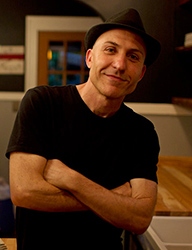 |
|
| Dave Weich | |
In the early 2000s, Powell's built up a nice business selling new titles Amazon had overbought. As Weich wrote, "Amazon started selling overstock to us by the pallet. Many pallets. Powell's was unique among potential buyers in that we sold enough books to replenish in such bulk, and Portland is just a short drive down I-5 from Amazon. We made easy partners."
The sales were "our most profitable inventory. They sold much faster than used books, and at a far greater profit than new ones. Priced at a discount, a viable market existed for them. So Powell's bought more and more. And then Powell's bought more warehouse space to accommodate the more and more. Our dot-com and marketing teams moved from a 10,000-square foot building in the gentrifying Pearl District to a 60,000-square foot warehouse on the edge of the city. Our staff grew in order to handle all these books: receiving them off trucks, unpacking boxes, data entering and shelving, and then only a few weeks later pulling the same books from those shelves and packing them to ship. We got very good at all that."
Powell's wanted to diversify, but "there were no other sources of such fast-selling books at such low prices. There was only Amazon.
"And of course they stopped selling to us. Amazon realized that they could make more money by holding onto the books a while longer and selling directly to their own customers; and when they were ready, they did. But not until we'd invested in infrastructure and equipment, not until we'd hired staff, not until we'd scaled to serve customers who thereafter didn't find many of the books they'd come to expect in our stores and at Powells.com. That sucked."
For Amazon's new partners in Portland, particularly the New Seasons grocery chain, Weich sees a similar situation developing. "What is New Seasons' plan if Prime Now catches on? How will their model evolve to handle the growth? They'll need new and expanded supply chains, right? What else? More warehouse space and staff? Will they ramp-up investments in technology? Can they maintain the superior food quality and best-in-town in-store experience?
"The articles I've read haven't mentioned how much money Amazon takes from each transaction through Prime Now, but you can bet it's a healthy cut. That means that as the delivery app catches on, an ever-increasing proportion of New Seasons' revenue will be generated at smaller margins.
"And all of that revenue, day-to-day and quarter-to-quarter, will be dependent upon the functionality and features of the app, which no doubt Amazon will reinvent when and how it pleases."
"I'd like to ask a publisher, or any of Amazon's other so-called partners: How should these businesses protect themselves for the day when 'The Everything Store' deems that it's no longer in its best interest to make the partners as profitable? Or, worse and just as likely, once Amazon has established the local infrastructure and customer base to compete directly."
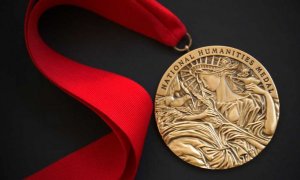 Yesterday, the White House announced this year's recipients of the National Humanities Medal. William Adams, chairman of the National Endowment for the Humanities, said, "The recipients of this medal have sparked our imaginations, ignited our passions, and transformed our cultural understanding. They embody how the humanities can serve a common good." On September 10, President Obama will present the award to these 10 honorees:
Yesterday, the White House announced this year's recipients of the National Humanities Medal. William Adams, chairman of the National Endowment for the Humanities, said, "The recipients of this medal have sparked our imaginations, ignited our passions, and transformed our cultural understanding. They embody how the humanities can serve a common good." On September 10, President Obama will present the award to these 10 honorees:
Annie Dillard, author, for her profound reflections on human life and nature.
Jhumpa Lahiri, short story writer and novelist, for enlarging the human story.
Larry McMurtry, author, for his books, essays and screenplays.
Alice Waters, author and food activist, for celebrating the bond between the ethical and the edible.
Rebecca Newberger Goldstein, philosopher and novelist, for bringing philosophy into conversation with culture.
Evelyn Brooks Higginbotham, historian, for illuminating the African-American journey.
Vicki Lynn Ruiz, historian, for her contributions as a historian.
Fedwa Malti-Douglas, scholar, for her studies of Arabic letters.
The Clemente Course in the Humanities, for offering free humanities education to thousands of men and women, enriching their lives and broadening their horizons.
Everett L. Fly, architect and preservationist, for preserving the integrity of African-American places and landmarks.
Yesterday, Patrick Ness launched a fundraising page for Save the Children, with the money going "to help with the Syrian refugee crisis because I can no longer stand to just tweet about it." Within hours, readers had donated £40,000 (about $60,935), which was matched by £10,000 donations from Ness and fellow authors John Green, Derek Landy and Jojo Moyes, the Bookseller reported. Although the original goal was £60,000, as of this morning the total raised had exceeded £190,000 and was still growing.
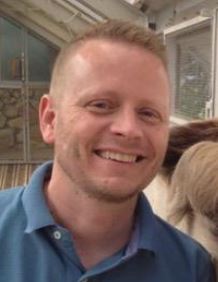 |
|
| Patrick Ness | |
"I feel like I have to do something. If we can all give money, it is something, however small," said Ness, who had originally announced the crowdfunding effort with a tweet: "Okay, I don't know if this'll work but I'll match donations up to £10k to do *something* to help this refugee crises."
"I think it says that there are so many people who feel helpless, just like me, looking at those pictures and fuming about this government's inhumane non-approach," Ness told the Guardian. "They want to do something. That's the message I'm getting.... It's been a busy day. But please give a little if you can."
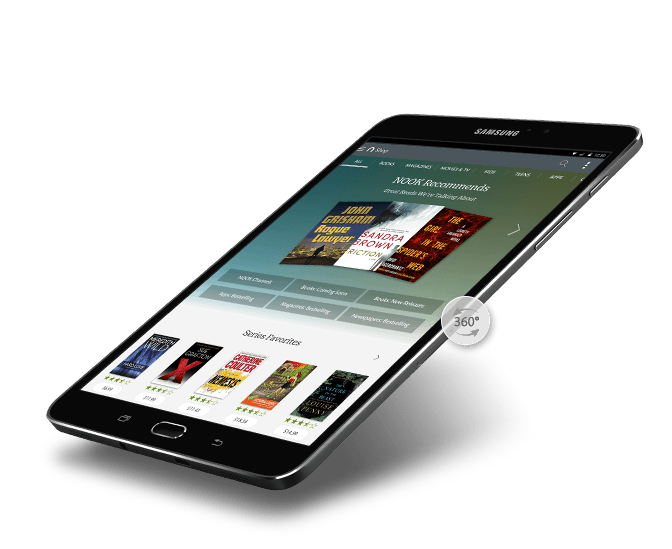 Barnes & Noble has unveiled a new co-branded Samsung Galaxy Tab S2 Nook, an 8-inch tablet described as Samsung's "thinnest, lightest tablet yet" at 9.3 ounces, and the "new flagship" of the company's tablet line. The device is now available at B&N stores nationwide and online for $399.99. Calling it "our best ever Nook tablet," B&N chief digital officer Fred Argir said his company is "proud to continue our partnership with an industry leader."
Barnes & Noble has unveiled a new co-branded Samsung Galaxy Tab S2 Nook, an 8-inch tablet described as Samsung's "thinnest, lightest tablet yet" at 9.3 ounces, and the "new flagship" of the company's tablet line. The device is now available at B&N stores nationwide and online for $399.99. Calling it "our best ever Nook tablet," B&N chief digital officer Fred Argir said his company is "proud to continue our partnership with an industry leader."
Gary Riding, senior v-p of mobile computing at Samsung, commented: "Our partnership with Barnes & Noble allows us to deliver once again on our promise to provide consumers with beautiful technology that empowers them throughout their daily lives."
Prominent Western Australian historian Geoffrey Bolton, who "is credited for bringing much of WA's history and political development to the everyman," died yesterday, ABC reported. He was 83. Bolton wrote more than a dozen books, including Land of Vision and Mirage: Western Australia since 1826.
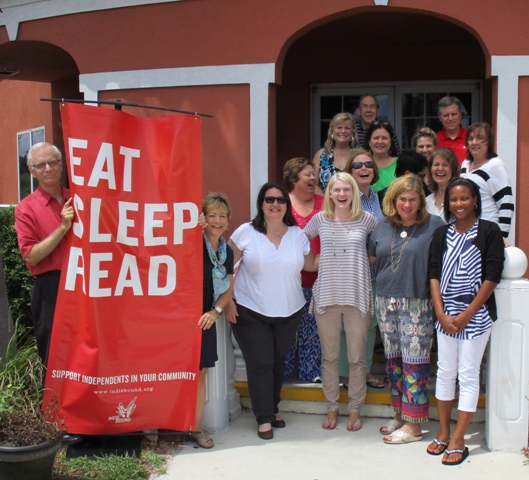 During last week's workshop retreat "Owning a Bookstore: The Business Essentials," facilitated by the Bookstore Training Group of Paz & Associates and co-sponsored by the American Booksellers Association, 15 book industry trainers shared best practices of bookstore retail management with prospective and existing booksellers from across the country, and even the Dominican Republic. Pictured from front: facilitators Mark and Donna Paz Kaufman, Kelly Whitman, Janet Lynn Hardy, Deavours Hall, Deserea Russell, Anne Hughes, Margi Watters, Carla Dominguez, Laurie Gillman, Leslie Huerta, Martha Dumont, Melene Hatcher, Darlene Krogol, Dave Krogol and Ben Hatcher.
During last week's workshop retreat "Owning a Bookstore: The Business Essentials," facilitated by the Bookstore Training Group of Paz & Associates and co-sponsored by the American Booksellers Association, 15 book industry trainers shared best practices of bookstore retail management with prospective and existing booksellers from across the country, and even the Dominican Republic. Pictured from front: facilitators Mark and Donna Paz Kaufman, Kelly Whitman, Janet Lynn Hardy, Deavours Hall, Deserea Russell, Anne Hughes, Margi Watters, Carla Dominguez, Laurie Gillman, Leslie Huerta, Martha Dumont, Melene Hatcher, Darlene Krogol, Dave Krogol and Ben Hatcher.The Pen to Plate Dinner Series, which Morris Book Shop, Lexington, Ky., connects customers directly with classic cookbooks, the foods they inspire and the chefs that love them: beginning in July and extending into October, the idea is for a chef to create a four-course meal directly from his or her favorite cookbook and serve 16 diners in the bookstore--and interact with guests between every course.
The series was conceived with the help of local culinary evangelist and MasterChef alumnus Dan Wu, who cooked the first dinner, riffing on Smoke and Pickles by Edward Lee. So far, the store has held two dinners; two more are on the menu.
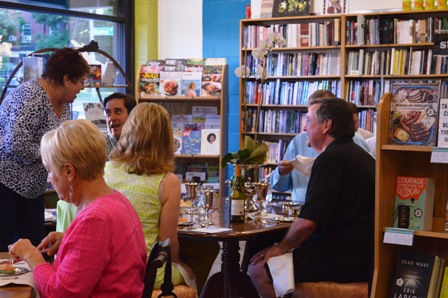
Cunningham said that reaction has been "wonderful. People have been super excited at the idea of dinner at Morris, getting to know chefs, and hearing about the chefs' memories with the various cookbooks." She added that she's been surprised by how "diners have interacted with one another. It seems everyone has come to the store ready to meet their tablemates. People have really adored the chef interaction throughout the dinner."
The idea for the series was born when staff member Gretchen Collins started copying recipes out of The Moosewood Cookbook. This prompted conversations with her colleagues, each of whom had different memories tied to Moosewood: how it taught them to not be fearful when cooking vegetarian food, and introduced them to spices and recipes that have since become staples for them. Collins confessed she had used her own copy so much that the pages of a particular recipe were no longer legible. 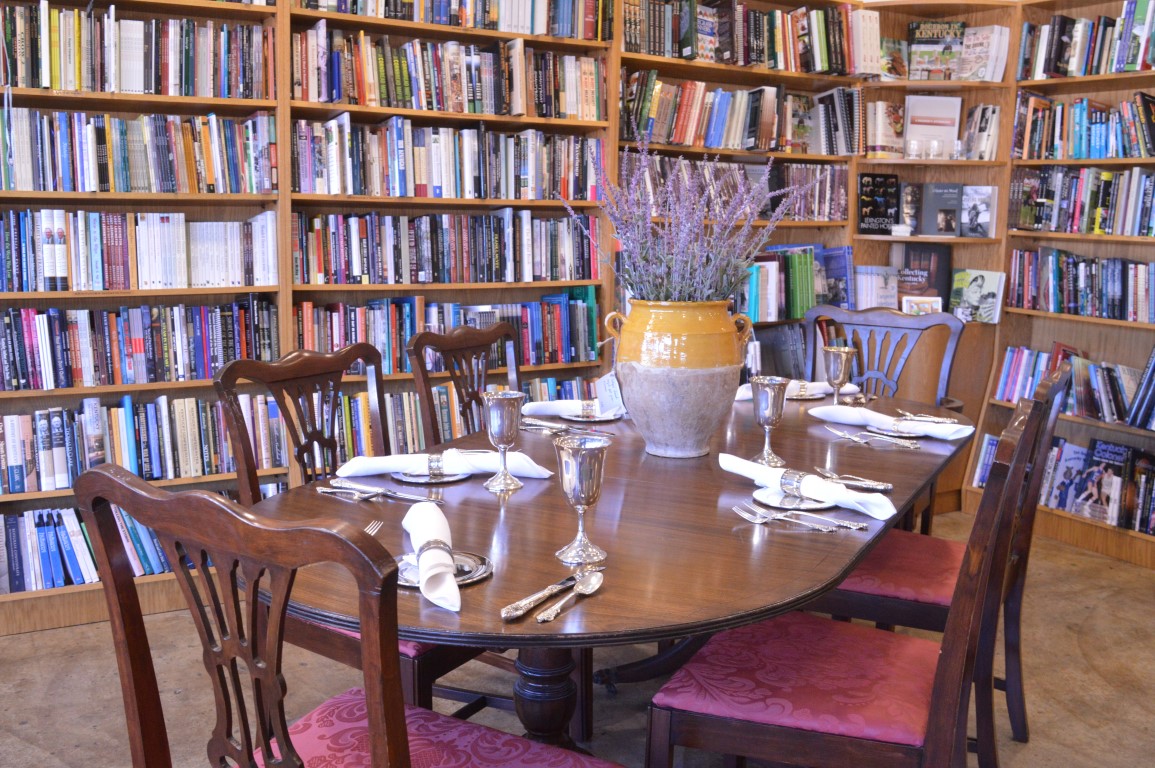
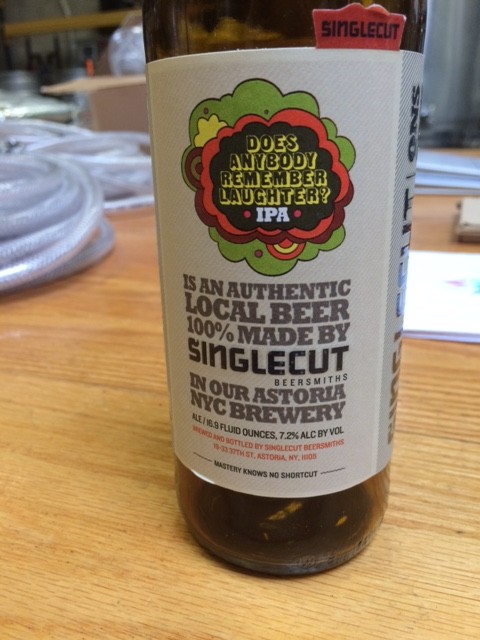 Writer and photographer Michael David Murphy (brother of HarperCollins Children's Books national accounts rep Deborah Murphy), has created a website called Book or Beer. Users are presented with a title and must guess if it belongs to a YA book or a craft beer from New York. If it's a beer, a link takes users to the brewer's website. If it's a book, users are directed to the title's IndieBound page.
Writer and photographer Michael David Murphy (brother of HarperCollins Children's Books national accounts rep Deborah Murphy), has created a website called Book or Beer. Users are presented with a title and must guess if it belongs to a YA book or a craft beer from New York. If it's a beer, a link takes users to the brewer's website. If it's a book, users are directed to the title's IndieBound page.
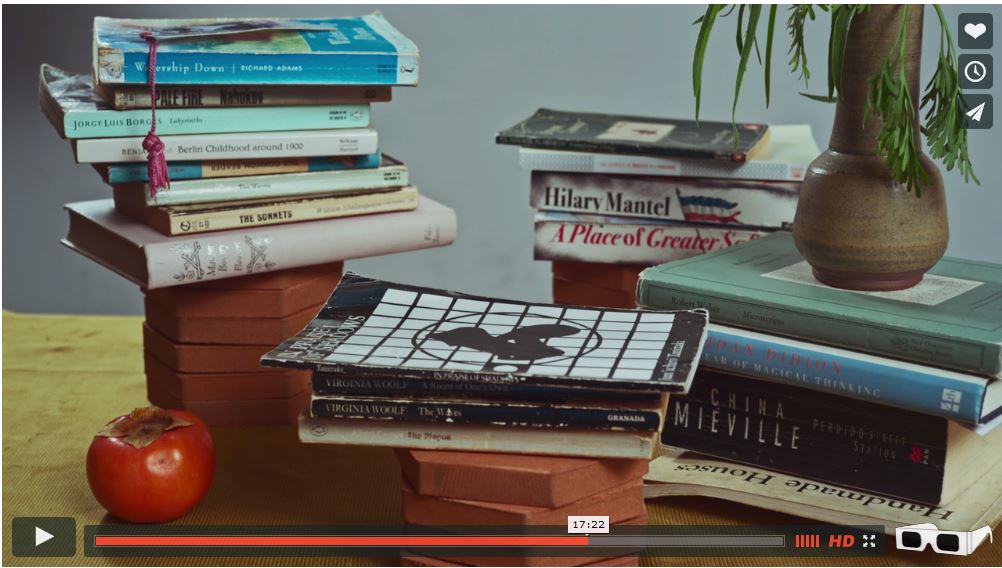
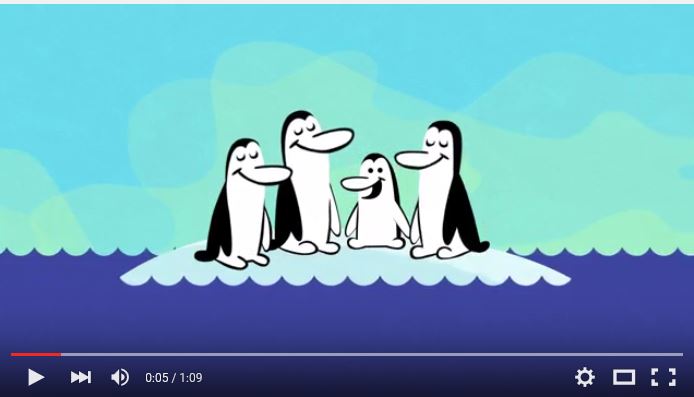
Sunday on Meet the Press: Dick Cheney and Liz Cheney, authors of Exceptional: Why the World Needs a Powerful America (Threshold Editions, $28, 9781501115417). They will also appear on Fox News Sunday.
---
Sunday on Face the Nation: David McCullough, author of The Wright Brothers (Simon & Schuster, $30, 9781476728742).
---
Sunday on ESPN's Behind the Lines: Monte Burke, author of Saban: The Making of a Coach (Simon & Schuster, $27, 9781476789934). He will also appear on an ESPN Nick Saban Special.
---
Monday on NPR's Morning Edition: Erika Lee, author of The Making of Asian America: A History (Simon & Schuster, $29.95, 9781476739403).
---
Monday on NPR's On Point: Barry Schwartz, author of Why We Work (Simon & Schuster/TED, $16.99, 9781476784861).
MTV has released a trailer for its upcoming fantasy series The Shannara Chronicles, based on the bestselling novels by Terry Brooks, Deadline.com reported. The series stars Poppy Drayton, Ivana Baquero and Austin Butler. Al Gough and Miles Millar (Spider-Man 2, Smallville) are the showrunners, as well as executive producers with Brooks, Jon Favreau, Jonathan Liebesman, Dan Farah and Gene Stein.
Lakeshore Entertainment has added David Strathairn, Peter Riegert, Uzo Aduba (Orange Is the New Black) and Valorie Curry to the cast of American Pastoral, based on Philip Roth's novel, Variety reported. Ewan McGregor will star and direct from John Romano's adaptation. The cast also includes Jennifer Connelly and Dakota Fanning, who were previously announced as the female leads. Filming is scheduled to begin later this month in Pittsburgh, Pa.
---
"After spending years in development limbo, Disney's adaptation of Eoin Colfer's novel Artemis Fowl may have found new life" now that Kenneth Branagh has signed on to develop the property and is attached to direct, Variety reported. Playwright Conor McPherson is in talks to write the script, with Harvey Weinstein and Branagh producing.
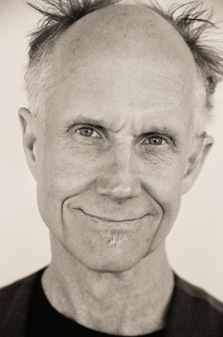 |
|
| photo: Ann Staveley | |
Tony Hoagland's fifth and newest collection of poems, Application for Release from the Dream, was published by Graywolf Press on September 1, 2015. His most recent collection of essays about poetry is Twenty Poems That Could Save America and Other Essays, also from Graywolf. Hoagland teaches at the University of Houston.
On your nightstand now: Winter Pollen, essays by Ted Hughes. Hughes has a masterful poetic intelligence, erudite, rational and also radically intuitive; like D.H. Lawrence, he belongs to the hairy shamanic camp of the Brits. Thrown, a memoir of cage fighters by Kerry Howley--what an entertaining piece of anthropology; Survival in Auschwitz by Primo Levi; Gun Street Girl by Adrian McKinty. I don't read poetry before bedtime: it's over-stimulating, and can easily murder sleep. Oddly enough, murder mysteries rarely murder sleep.
Favorite book when you were a child: Rudyard Kipling's Just So Stories. Kipling has such an amazing musical ear, and a deep sense of storytelling as ceremony and myth. I also read a hundred collections of folk and fairy tales: Persian fairy tales, Indian fairy tales, Greek fairy tales--anything. It was very much of a narcotic for me--I have no clue of any influence those big anthologies had on me. I just wanted to go away.
Your top five (or six) authors:
One reason that this question is difficult to answer is psychological: there are many writers who were life's blood to me at certain points of my life, that I since have unconsciously repressed. That kind of repression often necessarily follows that kind of deep involvement (for the sake of one's autonomy). The process is somewhat violent and unconscious--a former strong influence is sometimes like a parasitic relative you would cross the street to avoid. I'd deny that I knew them, as Peter did Jesus--though not three times, I hope. That said, these remain: Frank O'Hara, W.H. Auden, W.S. Merwin, Louise Glück, Yehuda Amichai, George Bernard Shaw.
Book you've faked reading:
W.G. Sebald's The Rings of Saturn. Not faked--just that I haven't really clicked on what Sebald does literarily. With some writers, you just keep returning until they let you in.
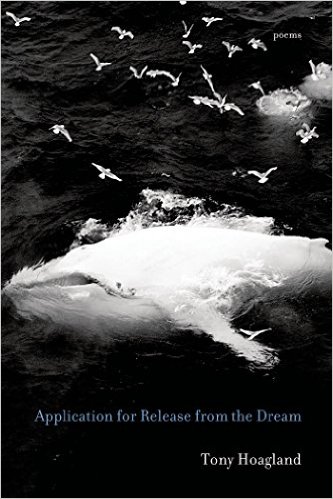 Books you're an evangelist for:
Books you're an evangelist for:
Saul Bellow's Henderson the Rain King; Wallace Shawn's The Fever; The Descent of Alette by Alice Notley; and The End of the Novel of Love by Vivian Gornick. When I look at this list, I can see that all these texts braid together two recurrent strands of my interests--keen political insight and a rather Jungian understanding of the psyche. We human beings are immersed up to the neck in selves we can't see; we are perpetual mysteries to ourselves. Ironically, that invisibility is part of our functional intelligence, and often part of our power to act in inspired ways. I have always mistrusted people who truly believe that they know what they're doing. That is what makes politicians and capitalists such a shrieking nightmare.
Books that changed your life:
This may be a little embarrassing. Flowers for Algernon by Daniel Keyes; A Separate Peace by John Knowles; Be Here Now by Ram Dass; The New American Poetry, edited by Donald Allen; and "Travels in Georgia," the famous essay by John McPhee. Some of these for spell-binding and some for spell-breaking.
Favorite line from a book:
From the opening of the Grace Paley short story "The Story Hearer": "I am trying to curb my cultivated individualism, which seemed to me for years so sweet."
Here's another: "So I remember all those whose death/ is necessary condition of the season's putting forth," from "Easter" by Auden.
Then there is Ted Berrigan's memorable line in the poem "Frank O'Hara": "Grandmother divided by monkey equals outer space."
Books you most want to read again for the first time:
Raise High the Roof Beam, Carpenters and Seymour: An Introduction by J.D. Salinger; John Steinbeck's Cannery Row et al.; the early short stories of Ann Beattie, which I was over the moon about; Don Delillo's White Noise; and many others.
Once in a Great City: A Detroit Story by David Maraniss (Simon & Schuster, $32.50 hardcover, 9781476748382, September 15, 2015)
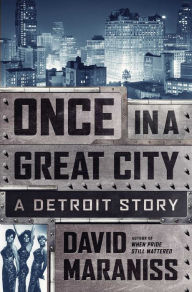 Once in a Great City, Pulitzer Prize-winning journalist David Maraniss's account of Detroit in the early 1960s, joins his They Marched into Sunlight and Rome 1960 to form what he calls a "sixties trilogy," exploring America's social and political history during that turbulent decade. This addition is a sobering portrait of a city that felt itself to be at the peak of its power and influence in a "time of uncommon possibility and freedom when Detroit created wondrous and lasting things," even as the forces that would topple it had set about their work.
Once in a Great City, Pulitzer Prize-winning journalist David Maraniss's account of Detroit in the early 1960s, joins his They Marched into Sunlight and Rome 1960 to form what he calls a "sixties trilogy," exploring America's social and political history during that turbulent decade. This addition is a sobering portrait of a city that felt itself to be at the peak of its power and influence in a "time of uncommon possibility and freedom when Detroit created wondrous and lasting things," even as the forces that would topple it had set about their work.
The principal strength of Maraniss's book lies in his skill at marshaling copious research to serve his sophisticated account of a complex, vibrant city balanced on its tipping point. Detroit's economy in those days was propelled by a robust automobile industry that "gave blue-collar workers a way into the middle class," as it churned out full-sized cars while shrugging off early warnings of competition from the compact models of nimbler foreign competitors.
Boasting a population approaching 1.7 million in 1960, Detroit soon faced the unintentionally destructive force of urban renewal and demographic realities like white flight, which would propel a population decline to barely 40% of that figure by the time the city filed for bankruptcy in 2013. Though these factors were evident to scholars, they were ignored or misperceived by local political and business leaders. In hindsight, their earnest efforts in support of Detroit's failed bid to host the 1968 Summer Olympics, as Maraniss describes them, seem almost comical in their naïveté.
Maraniss effortlessly blends deft treatment of these sociological and political issues with vivid portraits of the colorful characters whose energy drove Detroit during this period. From famous figures like UAW president Walter Reuther, his adversary (and occasional ally) Henry Ford II and Motown founder Berry Gordy Jr., to the lesser known but no less important civil rights leader Reverend C.L. Franklin (Aretha's father) and George Edwards, liberal state supreme court justice turned chief of police, Maraniss portrays a dynamic and engaged leadership pursuing agendas they believed would assure prosperity and racial harmony for their beloved city. Only a few years later, the devastating 1967 riots mocked their efforts.
Recent developments give some reason to hope that, as it emerges from bankruptcy, a much smaller and humbler Detroit will rebound from the worst of its decline. Sadly, one can't avoid the conclusion that never again will it be the city David Maraniss portrays with empathy and candor in this impressive book. --Harvey Freedenberg, attorney and freelance reviewer
Shelf Talker: Journalist David Maraniss offers a vivid portrait of Detroit at the peak of its power and influence in the early 1960s, even as it began decades of decline.
I remember
The crackle of the palm trees
Over the mooned white roofs of the town...
The shining town...
And the tender fumbling of the surf
On the sulphur-yellow beaches
As we sat... a little apart... in the close-pressing night. -- From "A Memory" by Lola Ridge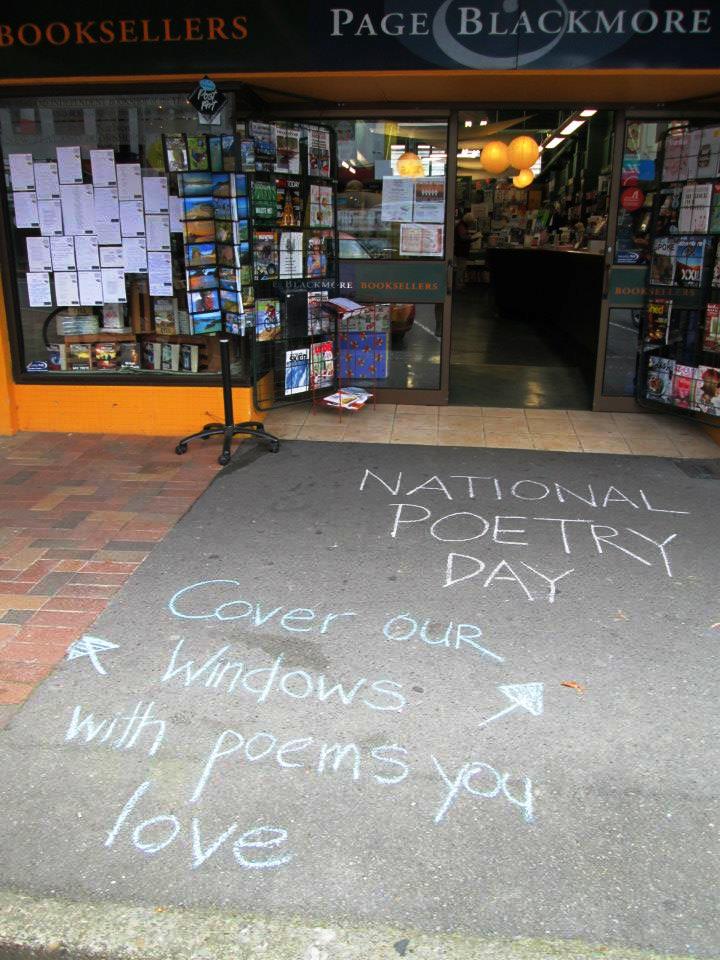 To celebrate National Poetry Day New Zealand last week, one of many events nationwide was "Poets at Dusk" at Page & Blackmore Booksellers in Nelson: "The sun sets and words arise." The bookshop also invited patrons to stick a favorite poem in its shop window.
To celebrate National Poetry Day New Zealand last week, one of many events nationwide was "Poets at Dusk" at Page & Blackmore Booksellers in Nelson: "The sun sets and words arise." The bookshop also invited patrons to stick a favorite poem in its shop window.
At Time Out Bookstore, an event called "All Tomorrow's Poets 2015" featured "another vibrant and diverse group of writers from across the Auckland sprawl.... Come and listen as these poets push through the congealed membrane of the traditional NZ canon."
For the Wairarapa region's "When Poetry Comes to Town" celebration, Hedley's Bookshop in Masterton held a "Paperbag Poems" event at which patrons could bring their lunch, "taste some of Jenny Hedley's famous soup and hear the favorite poems of ten people from the Masterton community: politicians, bankers, business people and members of community groups. Some of the poems will be familiar favorites but you may discover some new poems too. You can expect to be surprised, entertained and delighted."
While I've heard many, many opinions--positive as well as negative--over the years about setting aside a specific day or week or month to acknowledge the existence (or absence) of poetry in our lives, as a reader of poetry year-round I don't really have any qualms about these lit-markers because public festivals often lead me to unexpected writers.
This happened last year when I wrote a column about National Poetry Day NZ that began: "I don't know anything about New Zealand poetry, relatively speaking." In preparing for the piece, I read many poets who were new to me. This, of course, was the point, but something else happened subsequent to the column's publication that has prompted me to consider how our world of books, using words as thread, can weave readers and writers together.
After the 2014 column appeared, I received an e-mail from author Terese Svoboda that included a pair of amazing poetry book recommendations with New Zealand roots: Lola Ridge's Sun-Up and Other Poems, and Tusiata Avia's Wild Dogs Under My Skirt ("My Uncle once broke a man's hands/ quietly, like you would snap a biscuit/ in half").  More recently, I've been reading an ARC of Svoboda's terrific upcoming biography, Anything That Burns You: A Portrait of Lola Ridge, Radical Poet (Schaffner Press, January 2016). A human rights activist and acclaimed poet, Ridge lived what Svoboda described as "a very formative 24 years" in the New Zealand gold mining town of Hokitika before eventually ending up in 1920s New York City. Her friends included Marianne Moore and William Carlos Williams, while Emma Goldman and Margaret Sanger were among her mentors. Hers was an extraordinary international life distilled into striking poems.
More recently, I've been reading an ARC of Svoboda's terrific upcoming biography, Anything That Burns You: A Portrait of Lola Ridge, Radical Poet (Schaffner Press, January 2016). A human rights activist and acclaimed poet, Ridge lived what Svoboda described as "a very formative 24 years" in the New Zealand gold mining town of Hokitika before eventually ending up in 1920s New York City. Her friends included Marianne Moore and William Carlos Williams, while Emma Goldman and Margaret Sanger were among her mentors. Hers was an extraordinary international life distilled into striking poems.
"Finding my local poetry community was like finding my tribe. And it's a tribe that spans the globe," said Miriam Barr, national coordinator of National Poetry Day. "When I visited New York recently, I found the same tribe there, bunkered in from the snow at the Bowery Poetry Club's open mic and at the Nuyorican Poetry Cafe's slam. People hanging on each others words, leaning in to uncover the layers. Reading or listening to poetry gives me glimpses into other peoples' experiences, traces the borders of our differences, holds mirrors up to our similarities. It's inspired me when I've been lost. It has recorded the special moments and contained the painful ones. It's what I always come back to."
One stitch leading to another and another still. If not for National Poetry Day, I might never have read Lola Ridge or Tusiata Avia, and that would be my loss. We need all the poetry days and weeks and months we can get... for many reasons. I tie off these threads, for now, with Lola Ridge's poem "Scandal":
Aren't there bigger things to talk about
Than a window in Greenwich Village
And hyacinths sprouting
Like little puce poems out of a sick soul?
Some cosmic hearsay--
As to whom--it can't be Mars! put the moon--that way....
Or what winds do to canyons
Under the tall stars...
Or even
How that old roué, Neptune,
Cranes over his bald-head moons
At the twinkling heel of a sky-scraper.
--Robert Gray, contributing editor (column archives available at Fresh Eyes Now)